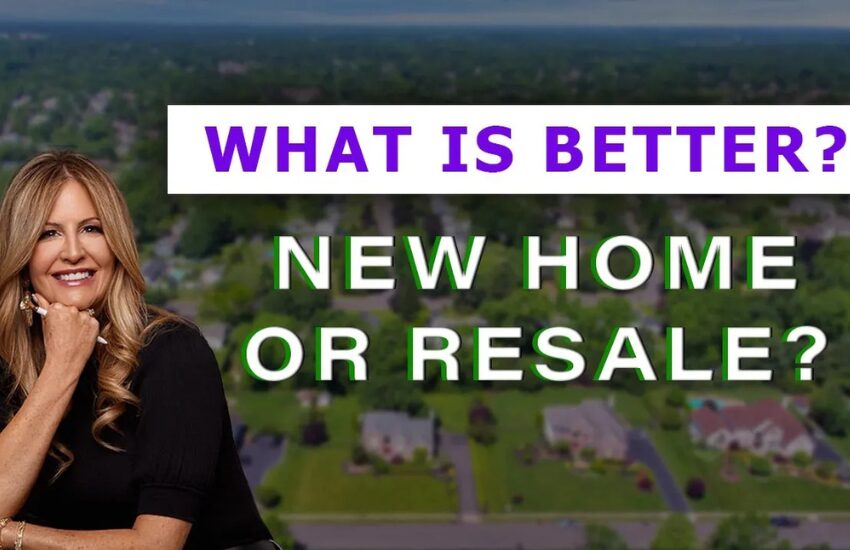When buying a home, one of your biggest decisions is whether to go for a brand-new construction or a resale property. Both options come with their own set of advantages and challenges. If you’re torn between the two, don’t worry—you’re not alone! In this post, I’ll break down the pros and cons of each option to help you make an informed decision for you and your family.

The Pros of Buying a Brand New Construction Home
- Everything is Brand New One of the biggest advantages of buying a new construction home is that everything is brand new! You won’t have to worry about previous wear and tear, and often, builders offer warranties that cover everything from the roof to the appliances, giving you peace of mind for years.
- Modern Features and Technology New homes are designed with the latest materials and technology. Expect energy-efficient features like better insulation, UV-blocking windows, and even smart home technology. These features not only help the environment but can also lower your utility bills.
- Customization One of the most exciting benefits of buying new construction is the ability to customize the home. Many builders allow you to select finishes, colors, countertops, flooring, and more. This means you can build a home that reflects your style right from the start—something you won’t typically get with a resale property.
However, there are a few drawbacks to consider regarding new construction homes.
Cons of New Construction Homes
- Location and Construction Zones New construction homes are often in developing areas, meaning living amidst ongoing construction. Expect noise, unfinished roads, and construction trucks for months, or even years.
- Long Wait Times Unlike resale homes you can move into almost immediately, new homes often take months, sometimes over a year, to finish. Unexpected delays, such as weather or supply chain issues, can push your move-in date further.
- Higher Prices and Additional Costs New construction homes typically have a higher price tag than resale properties. On top of that, many builders offer optional upgrades, such as premium countertops or appliances. This can quickly raise the overall cost of the home. Be prepared for these added expenses when budgeting for your new home.
- Minimal Landscaping New construction homes often come with basic landscaping—think simple lawns, a few small trees, and maybe a patio. It could take years for your yard to develop fully into the lush, private oasis you envision, and you might need to invest in professional landscaping to speed up the process.
- Uncertain Resale Value One factor to remember is the uncertainty of how your new home will appreciate over time. While new homes can hold value, predicting future appreciation can be trickier than homes in more established neighborhoods.
The Benefits of Buying a Resale Home
- Character and Charm Resale homes offer a sense of character and charm that newer homes often lack. They are typically located in more established neighborhoods, meaning larger lot sizes, mature landscaping, and more privacy.
- Immediate Move-In With resale homes, what you see is what you get. There’s no waiting for construction to be completed—you can move in immediately and enjoy the property. Older homes often have fully grown trees, established lawns, and outdoor amenities like pools and gazebos.
- Larger Lot Sizes Older homes were often built when land wasn’t as scarce. As a result, you may find resale properties with larger lots compared to newer homes. This gives you more space for a backyard, privacy, or future expansions.
- Potential for Negotiation Unlike new construction homes, resale homes can offer more room for negotiation. You can strike a better deal, whether it’s the purchase price, closing costs, or repairs based on the home’s condition.
Drawbacks of Resale Homes
- Higher Maintenance Costs One of the biggest challenges with resale homes is the potential for higher maintenance costs. Since the property isn’t brand new, wear and tear on major systems like the roof, HVAC, plumbing, and appliances can become a concern. Be sure to assess the age and condition of these components before making an offer.
- Outdated Designs Resale homes, especially older ones, may come with outdated designs that don’t fit modern preferences. Renovating is always an option, but it can be costly and time-consuming. If you’re looking for a home with a modern layout and finishes, a resale property may require some work to meet your needs.
- Less Customization With a resale home, you’re working with what’s already there. Major changes, such as knocking down walls or adding square footage, could require extensive renovation. Unlike new construction homes, where you can pick out everything from the floor plan to the finishes, resale homes offer limited customization options.
- Hidden Issues Even with a thorough inspection, there’s always a risk of hidden issues in resale homes. Problems like old wiring, plumbing issues, or foundational problems can be costly surprises that emerge after moving in.
Conclusion: Making the Right Choice for You
When deciding between a new construction home and a resale property, it ultimately comes down to your priorities. New construction homes offer the benefits of customization, modern features, and fewer maintenance concerns, but they come with higher prices and potential delays. On the other hand, resale homes provide character, immediate move-in, and larger lot sizes but may require more maintenance and updates.
As you weigh the pros and cons, think about what matters most to you—whether it’s moving in right away, customizing your space, or having a low-maintenance home. If you’re unsure about which option is best for your family, feel free to reach out. I’d be happy to help you navigate the decision-making process and find the perfect home for your needs.


Leave a Reply